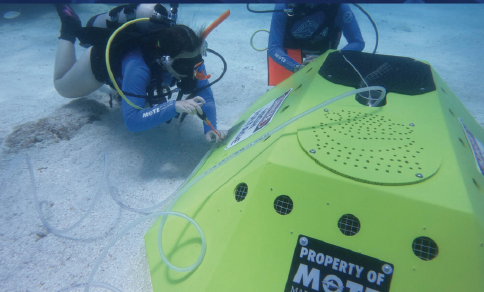Mote Marine Laboratory, in a project funded by the Southeast Coastal Ocean Observing Regional Association (SECOORA), successfully deployed a SeapHOx sensor, an instrument that monitors pH and dissolved oxygen (parameters measured for evaluation of ocean and coastal acidification), at Looe Key in the Florida Keys on Tuesday, June 11. Mote’s goal is to significantly increase and improve ocean acidification monitoring with the SeapHOx deployment. In leading this groundbreaking initiative, Mote aims to fill critical gaps in ocean acidification data, enhancing scientific understanding and protection of Florida’s coral reefs.
Ocean acidification occurs when carbon dioxide (CO2) from the atmosphere is absorbed into the ocean, leading to decreased pH. This change in pH adversely affects calcifying organisms like corals, shellfish, and some plankton species, which rely on calcium carbonate to form their skeletons and shells. Additionally, ocean acidification can weaken coral reefs, which both marine animals and humans rely on.
Florida’s coral reefs, the third largest barrier reef system in the world, are crucial to marine ecosystems and human economies. Coral reefs provide habitat for a substantial diversity of marine life, including thousands of species of fish, invertebrates, and other organisms. In addition, they act as natural barriers and protect shorelines from erosion and storm damage. Economically, coral reefs are invaluable, attracting 16 million visitors annually and contributing $8.5 billion to Florida’s economy while supporting over 71,000 jobs.
“Deploying the SeapHOx sensor is a milestone for our efforts to preserve coral reefs,” said Dr. Emily Hall, Manager of Mote’s Ocean Acidification and Chemical and Physical Ecology Research Programs. “By addressing the threats identified through this monitoring, we can help ensure that coral reefs continue to thrive and provide their essential services to marine life and human communities alike.”
Mote partnered with the Southeast Ocean and Coastal Acidification Network (SOCAN) and the U.S. Geological Survey (USGS) to install SeapHOx in a Marine Protected Area (MPA) of Looe Key. Its successful deployment represents a significant advancement in measuring pH and monitoring ocean acidification.
“This deployment exemplifies the critical need for partnerships and regional collaboration in addressing ocean acidification,” said Dr. Janet Reimer, SOCAN Co-Coordinator and Science Program Manager at the Mid-Atlantic Coastal Acidification Network (MACAN). “The data we gather will not only benefit Florida’s reefs but will also enhance our broader understanding of acidification impacts on coastal ecosystems.”
Key Highlights of the SeapHOx Deployment:
Enhanced Acidification Monitoring: The SeapHOx sensor provides high-quality, continuous data on pH, salinity, temperature, and dissolved oxygen, crucial for tracking the change in ocean acidity and acidification on coral reefs.
Strategic Location: The deployment site near Looe Key MPA is critical for understanding the dynamics of ocean acidification in a region with high biodiversity and significant coral cover.
Detection and Analysis: The sensor data will be used to identify signs of stress in the reefs, track changes over time, and understand the specific conditions that lead to coral bleaching and other detrimental effects.
Long-term Data Collection: The sensor will provide continuous data, contributing to a long-term time series essential for tracking changes and informing conservation strategies.
“The high-resolution data collected will allow us to detect subtle changes in the reef environment, providing warning signs of stress conditions,” said Dr. Kimberly Yates, Senior Research Oceanographer at the USGS. “This technology will allow us to continue developing proactive conservation strategies and approaches for mitigating the effects of acidification.”
This project will generate critical data for modeling and predicting ocean acidification impacts across the Florida reef tract and beyond. Additionally, the data will inform policy decisions made by the Florida Keys National Marine Sanctuary (FKNMS) and other regional stakeholders to protect Florida’s reefs for future generations. As Mote and its partners continue to combat the challenges faced by coral reefs, such initiatives are crucial for preserving the biodiversity and economic value of coral reefs worldwide.

